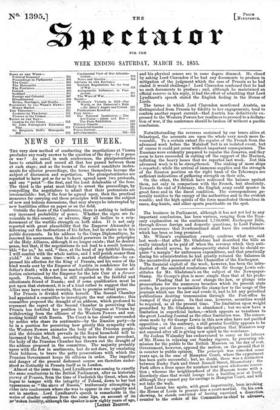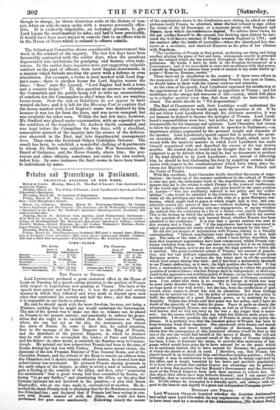The business in Parliament, although it has notyet led to
any important conclusions, has been various, ranging from the Trea- sury explanation on the continued 1,750,0001. Exchequer Bills, through divers foreign and domestic questions, to Lord Palmer- ston's assurance that Newfoundland shall have the constitution which has been so long promised. Mr. Wilson's explanation exactly confirms what we said last week—that after Mr. Gladstone had described the bills as really intended to be paid off when the revenue which they anti- cipated should accrue, he subsequently stated that he should re- quire "a margin" for unforeseen expenditure, and that practically during his administration he had greatly reduced the balances in the uncontrolled possession of the Chancellor of the Exchequer.
The financial exploit of the week, however, has been the intro- duction of the amended resolutions which Sir George Lewis sub- stitutes for Mr. Gladstone's on the subject of the Newspaper- Stamp. Sir George's plan is more simple than that of his prede- cessor. Pleading that he must change the law, or plunge into prosecutions for the numerous breaches which its present state invites, he proposes to assimilate the stamp-law to the usage of the journals which use the law and evade it, and to let any periodical publications desiring transmission through the Post-office be stamped if they please. In that case, however, securities would be required, as at the present time. The limitation upon weight prescribed by Mr. Gladstone is abandoned ; but we now have a limitation in superficial inches,—which appears as vexatious to the great Leading Journal as the other limitation was. The conces- sions made by Sir George Lewis in this new plan have not pacified opposition ; on the contrary, a still greater hostility appears to be spreading out of doors ; and the anticipation that Ministers may not succeed after all is giving new spirit to the resistance.
Sir Joshua Walmsley has endeavoured to carry on the labours of Mr. Hume in relaxing our Sunday rigours, by procuring ad- mission for the public to the British Museum on the day of rest.
Government, however, opposed the motion, on the ground that it is counter to public opinion. The principle was conceded some years ago, in the case of Hampton Court, where the experiment has been quite successful ; but, no doubt, there was a distinction
between Bushy Park and Great Russell Street, Bloomsbury : the Park offers a freer space for numbers bent upon wholesome recrea-
tion • whereas the neighbourhood of the Museum teems with a disorderly class that would lounge into a building near at hand,
d_
although they cannot pay for carriage to Hampton Court, and will not take the walk.
thel4Hrdou court-martial. On his own Lseucanof Lords again, procure ghreimatai.cmopuro t-rtunit been invoking
VIE
showing, he stands convicted of ha g exercised a discretion. counter to the orders of the Commander-in-chief to a though to charge, he threw discretion aside at the dictate of tem- per, when an aide-de-camp spoke with a manner personally offen- sive. It is evidently impossible, -on technical grounds, to _give Lord Lncan the court-martial he asks; and had it been practicable, it would have been most -unjust to concede that to an officer who is in the House of Peers which is refused to officers outside.



























